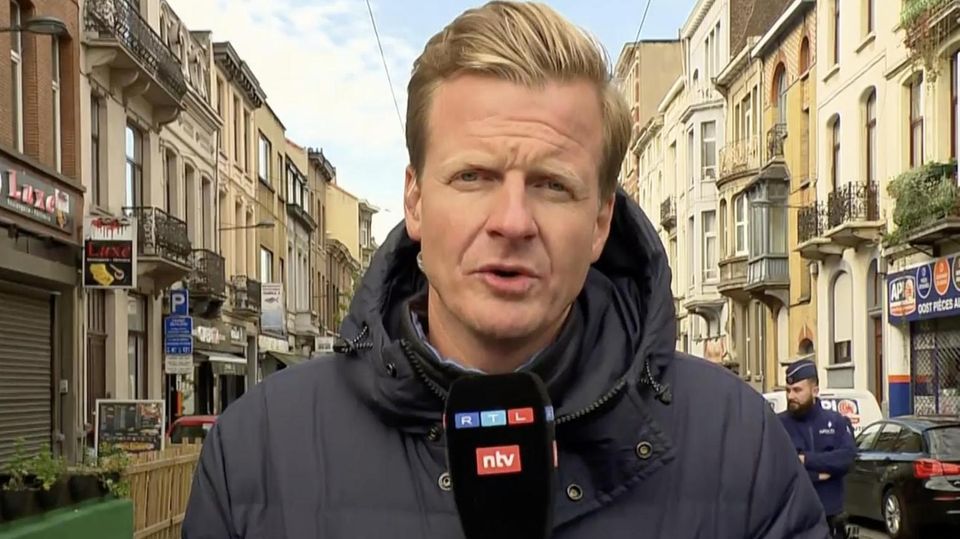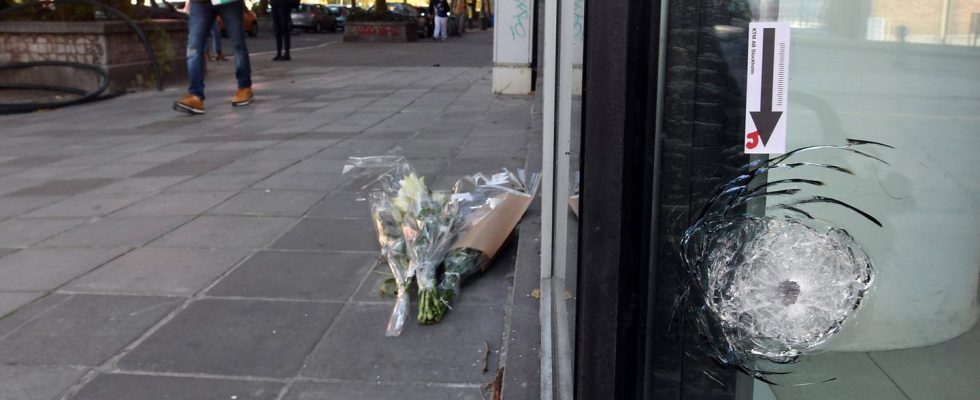Attack in Brussels
Drugs and prison: What is known about the Brussels attacker’s stays in Sweden and Italy
Flowers lie at the scene of the attack in Brussels in which two Swedes were killed. A bullet hole can be seen
© PHILIPPE PAUCHET / Imago Images
The suspected Brussels attacker, who killed two people, was also in Sweden and Italy years ago. According to media reports, he was in prison in Sweden.
About the suspected Brussels attacker Abdesalem L., who killed two people in the Belgian capital on Monday evening Sweden shot, more information comes to light. According to the Italian right-wing government, the 45-year-old came to Europe in 2011 on a refugee boat from Tunisia via the Italian Mediterranean island of Lampedusa. After a stay in Sweden, he was classified and monitored as a radical Islamist by the Italian authorities in 2016, the Ansa news agency reported, citing the government. He later moved to Belgium.
In Sweden, Abdesalem L. was imprisoned for a while, the Swedish migration authority said. “He served a prison sentence between 2012 and 2014,” an authority spokesman said on Tuesday, according to the AFP news agency. It initially remained unclear why the Tunisian was sentenced to prison.
The Brussels attacker was imprisoned in Sweden
The Swedish television channels SVT and TV4 reported that the suspected Brussels attacker was sentenced to more than two years in prison in 2012 for a serious drug offense. In addition to the prison sentence, he was sentenced to ten years of expulsion. In the judgment, his name was spelled differently than on his Belgian identity documents, but his date of birth was the same. According to the broadcaster, L. had 100 grams of cocaine with him when he was arrested in Malmö, and several thousand Swedish kroner were also confiscated. Another 100 grams of cocaine were found in his apartment.
TV4 further reports that L. lived in Gothenburg with a fake passport. He also appealed against the expulsion decision, but since he had no connection to Sweden and the crime he had committed was serious, he was sentenced to expulsion. He was banned from returning to Sweden before December 28, 2022, writes TV4.
“We note that he never had a residence permit in Sweden and that after serving a prison sentence in Sweden he was transferred to another EU country in accordance with the Dublin Regulation,” Jesper Tengroth, spokesman for the migration authority, told the TT news agency.
Belgium’s Justice Minister: “There was no concrete evidence of radicalization”
Sweden has recently received international attention for authorizing several demonstrations desecrating the Koran. This is suspected as a possible motive for the attack.
According to the Belgian authorities, Abdesalem L. applied for asylum in November 2019 and received a negative decision in October 2020. L. was known to the police for, among other things, human trafficking, illegal residence and attacks on state security, said Justice Minister Vincent Van Quickenborne. In 2016, there was a tip from foreign police that the man had become radicalized and wanted to travel to a conflict area.
This was checked by the Belgian authorities but was not followed up, said Van Quickenborne. “There was no concrete evidence of radicalization, which is why the person was not included in the relevant register,” he said.
Media report: Brussels attacker sought asylum in Norway
The suspected Brussels attacker is also said to have applied for asylum in Norway. “We can confirm that the alleged perpetrator applied for asylum in Norway in June 2011. His application was rejected and he was sent back to Italy in November 2011,” the Norwegian migration authority told the newspaper “VG” with. In order to apply for asylum in Norway, you must be in the country or at a Norwegian border.

The deputy prime minister of the incumbent right-wing government in Italy, Matteo Salvini, viewed the new findings on Wednesday as evidence that he was correct in his warnings about Islamist terrorists landing on Lampedusa. “I was accused of fomenting hatred. But I was right,” said the former interior minister and current transport minister of the right-wing Lega party.
The small island of Lampedusa has been one of the hubs of migration from Africa to Europe for years because of its proximity to Tunisia. This summer, several thousand migrants arrived there every day after the dangerous crossing in small boats. Currently there are usually a few dozen per day. The number of arrivals depends heavily on the weather. Fatal accidents occur again and again during the crossings.
In the attack in Brussels on Monday evening, two Swedish fans were shot dead on the sidelines of a football match between Belgium and Sweden. The terrorist militia Islamic State (IS) has now claimed responsibility for the crime.
Sources: news agencies DPA and AFP, SVT, TV4, “Aftonbladet”, “VG”

